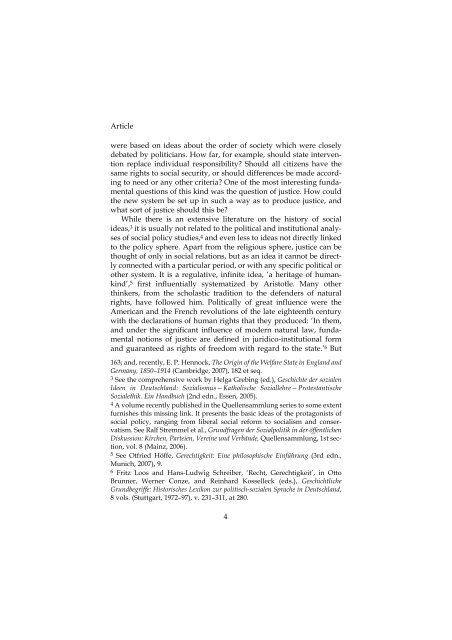Download - German Historical Institute London
Download - German Historical Institute London
Download - German Historical Institute London
You also want an ePaper? Increase the reach of your titles
YUMPU automatically turns print PDFs into web optimized ePapers that Google loves.
Article<br />
were based on ideas about the order of society which were closely<br />
debated by politicians. How far, for example, should state intervention<br />
replace individual responsibility? Should all citizens have the<br />
same rights to social security, or should differences be made according<br />
to need or any other criteria? One of the most interesting fundamental<br />
questions of this kind was the question of justice. How could<br />
the new system be set up in such a way as to produce justice, and<br />
what sort of justice should this be?<br />
While there is an extensive literature on the history of social<br />
ideas, 3 it is usually not related to the political and institutional analyses<br />
of social policy studies, 4 and even less to ideas not directly linked<br />
to the policy sphere. Apart from the religious sphere, justice can be<br />
thought of only in social relations, but as an idea it cannot be directly<br />
connected with a particular period, or with any specific political or<br />
other system. It is a regulative, infinite idea, ‘a heritage of human -<br />
kind’, 5 first influentially systematized by Aristotle. Many other<br />
thinkers, from the scholastic tradition to the defenders of natural<br />
rights, have followed him. Politically of great influence were the<br />
American and the French revolutions of the late eighteenth century<br />
with the declarations of human rights that they produced: ‘In them,<br />
and under the significant influence of modern natural law, fundamental<br />
notions of justice are defined in juridico-institutional form<br />
and guaranteed as rights of freedom with regard to the state.’ 6 But<br />
163; and, recently, E. P. Hennock, The Origin of the Welfare State in England and<br />
<strong>German</strong>y, 1850–1914 (Cambridge, 2007), 182 et seq.<br />
3 See the comprehensive work by Helga Grebing (ed.), Geschichte der sozialen<br />
Ideen in Deutschland: Sozialismus—Katholische Sozial lehre—Protestantische<br />
Sozialethik. Ein Handbuch (2nd edn., Essen, 2005).<br />
4 A volume recently published in the Quellensammlung series to some extent<br />
furnishes this missing link. It presents the basic ideas of the protagonists of<br />
social policy, ranging from liberal social reform to socialism and conservatism.<br />
See Ralf Stremmel et al., Grundfragen der Sozialpolitik in der öffentlichen<br />
Diskussion: Kirchen, Parteien, Vereine und Verbände, Quellensammlung, 1st section,<br />
vol. 8 (Mainz, 2006).<br />
5 See Otfried Höffe, Gerechtigkeit: Eine philosophische Einführung (3rd edn.,<br />
Munich, 2007), 9.<br />
6 Fritz Loos and Hans-Ludwig Schreiber, ‘Recht, Gerechtigkeit’, in Otto<br />
Brunner, Werner Conze, and Reinhard Kosselleck (eds.), Ge schicht liche<br />
Grundbegriffe: Historisches Lexikon zur politisch-sozialen Sprache in Deutsch land,<br />
8 vols. (Stuttgart, 1972–97), v. 231–311, at 280.<br />
4













